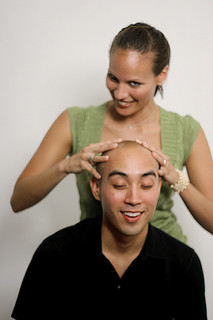
by Richard Keane
Hair loss is a common problem that affects both men and women. Losing your hair can cause you to suffer from a lack of confidence since you may feel that you look older or less attractive, which may have implications for the way you interact and socialise with others.
Hair loss can be caused by many different things, from genetics to illness, but the worlds of technology and science are continually advancing and evolving and new treatments are becoming available all the time. There are also many natural remedies that have been used for hundreds of years.
What Causes Hair Loss?
Hair loss can be caused by a range of different factors, from genetics in the case of male and female pattern baldness to underlying health conditions, stress, side-effects of medical treatment and alopecia.
 Male pattern baldness is very common affecting more than half of men over the age of 50. Most men start to develop areas of thinning hair at the hairline (known as the receding hairline) as they age, which is followed by thinning on the crown of the head and the temples. In many cases the hair at the back of the head remains quite thick for a number of years once balding has started.
Male pattern baldness is very common affecting more than half of men over the age of 50. Most men start to develop areas of thinning hair at the hairline (known as the receding hairline) as they age, which is followed by thinning on the crown of the head and the temples. In many cases the hair at the back of the head remains quite thick for a number of years once balding has started.
If you notice that you are losing your hair there may be a medical reason, so it is always worth seeing your doctor, particularly if you are suffering from other symptoms. Anaemia, a deficiency of iron in the body, can cause hair to fall out.
However, anaemia can usually be treated effectively with iron supplements and changes in diet, which usually stops hair loss.
Treatments for medical conditions can also trigger hair loss, such as the body’s reaction to chemotherapy, for example, which is used to treat cancer.
What Are Other Causes?
Stress has all sorts of effects on the body and hair loss can be one such side-effect. Many people experience stress, which may be caused by several different factors, such as being work-related or due to financial pressure, strained family relationships or even bereavement.
Alopecia is an autoimmune condition which causes the body to attack the hair follicles, mistaking them for a harmful threat. In most cases it is very difficult to treat alopecia and many people suffer from permanent baldness.
Many women also find that they lose their hair after having a baby, which is due to the levels of hormones decreasing after giving birth.
Medical Treatments
In recent years hair transplants have become increasingly popular and celebrities, including England footballer Wayne Rooney, have raised the profile of the procedure, showcasing the results on social media sites such as Twitter.
Hair transplants can be really effective and the results are increasingly impressive as techniques become more sophisticated. However, they do cost thousands of pounds and not everyone has a celebrity bank balance to foot the bill for hair loss treatment.
For those who cannot afford a transplant there are other options that are much more purse-friendly. Medicinal shampoos have been proven to be very effective but if you prefer the natural approach, it may be worth trying some of the remedies suggested below.
Affordable Natural Remedies
Natural remedies have the benefit of being cheap as well as organic and many people prefer to try them before considering medical treatment.
Aromatherapy, acupuncture and massage have all been used in the treatment for alopecia, although different people experience varying levels of success. These therapies can also be therapeutic and beneficial for patients who are recovering from cancer and have suffered from hair loss as a result of chemotherapy treatment.
Many different oils have been championed as effective remedies for hair loss, including amla oil, coconut oil, thyme, bay, cedar essential oils and mustard oil. Some people also believe that using aloe vera on the scalp helps to prevent hair loss by stimulating two enzymes which are involved with natural hair growth.
Herbs have also been used for centuries. Thyme and rosemary are often said to have healing properties and can promote hair growth when mixed together, boiled and then used as a hair rinse after shampooing.
There is also evidence to suggest that eating a healthy, balanced diet full of fruits and vegetables can contribute to healthy, thick and lustrous hair. You should aim for 5 different portions of fruit and vegetables per day to ensure that your body gets all the nutrients, vitamins and minerals it needs to function effectively.
Which Route Should You Take?
Hair loss can be devastating but there are options out there. If you’re not made of money and would rather rely on Mother Nature than turn to medications and procedures; there is a host of recipes, potions and herbal remedies believed to promote hair growth and prevent further hair loss. Ultimately it will come down to what kind of success you have with natural remedies.
(Richard is a freelance writer who creates content on wide range of topics, including hair loss and hair transplants, dentistry and living green. You can follow him @thefreshhealth on Twitter.)





Be the first to comment